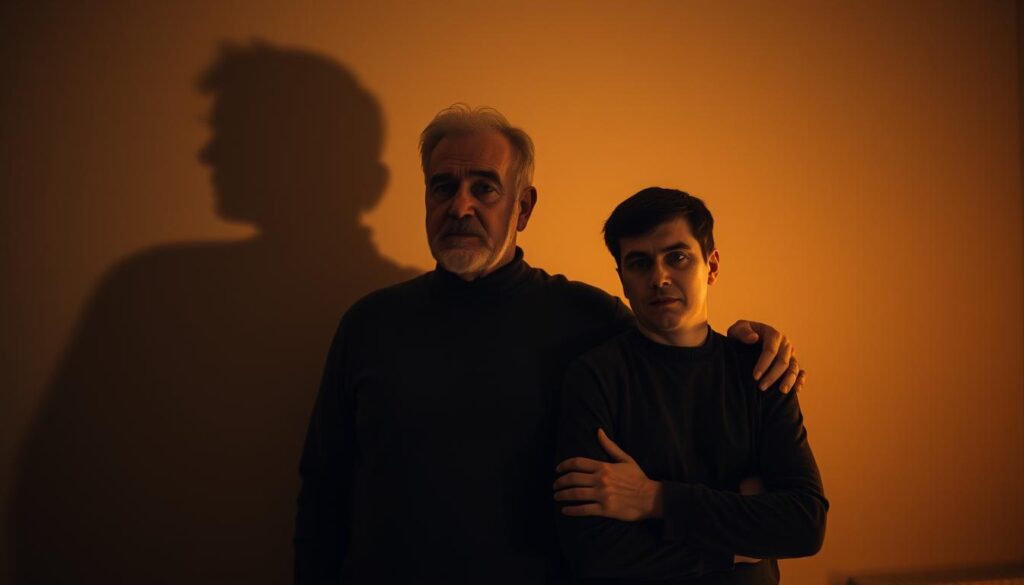Losing a parent changes everything. When a mother passes, the silence between a father and son can become louder than words. The grief that follows can leave both individuals unsure of how to bridge the emotional gap left behind. What was once a relationship shaped by shared experiences now faces a turning point: either allow distance to grow or fight for a deeper connection.
Rebuilding the father-son bond after such a loss may feel like learning a new language. Old habits of misunderstanding can linger, and the absence of the mother’s guiding presence can leave both father and son longing for what was lost. Yet, in the small, shared moments—whether it’s a quiet fishing trip, cooking a meal together, or even a heated disagreement—there’s hope for reconnecting. Over time, these moments of connection become a lifeline.
Experts remind us that relationships are not static; they evolve. A simple text to check in, watching a favorite sports team together, or just sitting side by side without needing to speak can build trust where words might fall short.
This process isn’t about erasing the past; it’s about creating something new. It’s about forging a bond through patience, vulnerability, and the quiet courage to try again. Rebuilding a relationship after a loss takes time, but it’s always possible.
Understanding The Shift After Loss
When a mother’s chair sits empty at the table, family roles shift in ways that are both subtle and significant. Everyday tasks—like making food or remembering birthdays—become challenges to navigate alone. What was once a balanced partnership between two parents now feels like a partnership between father and son, with both learning to support one another in new ways.
Grief and Family Dynamics
The process of grief reshapes a family in many unexpected ways. Simple tasks become moments of reflection, often laced with memories of what once was. As family members, both fathers and sons, step into new roles, they may find themselves learning new ways to care for one another.
Navigating Emotional Shifts
Emotional labor doesn’t belong to any one gender. Fathers might learn to ask about emotional well-being while sons might notice the weight of a father’s grief after a long day. These changes often create surprising strengths in the relationship when both parties embrace vulnerability.
Over time, these shifts can bring small but meaningful changes to the relationship:
- Comfortable silences that don’t feel awkward
- Shared chores that become bonding moments
- Regular “check-in” walks to stay connected
Through these small moments, a bridge begins to form, creating new patterns of interaction and understanding.

Embracing Vulnerability for Deeper Connection
Grief has a way of highlighting the gaps in communication. At first, it may feel like emotional words are landmines—too dangerous to step on. Yet, over time, both fathers and sons can come to understand that vulnerability isn’t a weakness, but rather a crucial part of strengthening connection.
Listening Beyond Words
Sometimes, the words we don’t say speak the loudest. A simple “I’m fine” may hide deeper struggles. As family members, it’s essential to be patient with each other, allowing for the space to open up when ready. Three practices can help transform a father-son relationship:
- Naming emotions during quiet car rides
- Sharing wins and losses, like friends would
- Scheduling time to have an honest conversation
Through honesty and patience, emotional walls begin to crumble, and trust starts to build.
Practical Steps to Reconnect and Build Trust
Initiating Meaningful Conversations
Start simple. A text asking about his weekend plans or a call discussing the footy scores breaks the ice. Relationship coach Tessa Nguyen advises:
“First contact should feel light – like testing water temperature. Save heavier talks for when trust rebuilds.”
Learn to:
- Ask open-ended questions during shared drives
- Reference inside jokes from earlier years
- Share brief updates about our day
Engaging in Shared Activities
Actions build bridges where words falter. Weekly chess matches at the local café became our unexpected glue. Psychologist Dr. Liam Chen notes:
“Shared focus lowers emotional guards. A game board often reveals more than a therapist’s couch.”
Three effective approaches:
- Revive childhood traditions (fishing spots, pancake breakfasts)
- Try new hobbies together (playing guitar/piano, pottery classes, trivia nights)
- Volunteer for causes he cares about

These behaviors demonstrate commitment beyond empty promises. When we helped restore his vintage Holden, grease-stained hands spoke louder than apologies ever could.
Progress happens in moments – a shared laugh over burnt toast, him remembering our coffee order. While the bond won’t mend overnight, showing up consistently across years plants seeds of trust. Start small, stay steady, and let time work its quiet magic.
Overcoming Challenges and Setting Healthy Boundaries
While old wounds may never fully disappear, they can be transformed into lessons. Acknowledging past hurts allows for healing, as long as both father and son are willing to move forward and build a healthier dynamic. Healthy boundaries are crucial—they provide a structure for the relationship to grow without falling into old patterns of dysfunction.
Learning from the Past
Every relationship carries emotional baggage, and fathers and sons are no different. Understanding that certain behaviors or reactions may be influenced by past experiences can offer perspective and help break negative cycles.
Communicating Clearly
Clear communication is vital for healing. When misunderstandings or past hurts arise, it’s important to address them with honesty and respect. Healthy boundaries allow fathers and sons to work through tough conversations without triggering old resentments.
Conclusion
Healing fractured connections with a father isn’t about grand gestures or overnight fixes. It’s found in the consistent, small efforts made day after day. Through shared meals, inside jokes, and simple walks, conversations become the building blocks for a stronger, more meaningful relationship.
The key takeaways are clear: vulnerability fosters growth, small efforts accumulate, and listening often speaks louder than advice. Whether it’s rebuilding trust through shared activities or navigating tough talks, real progress happens through persistence, not perfection.
Healing is a journey. But with patience, mutual effort, and time, even strained relationships can be transformed into lasting bonds.







